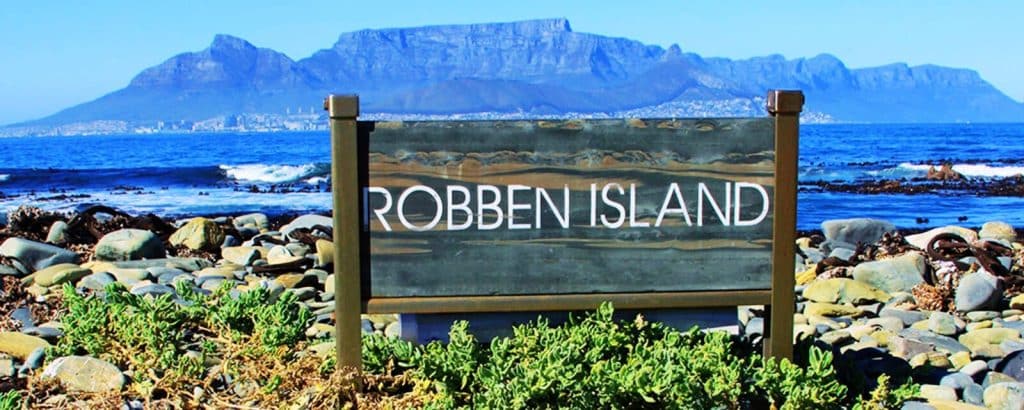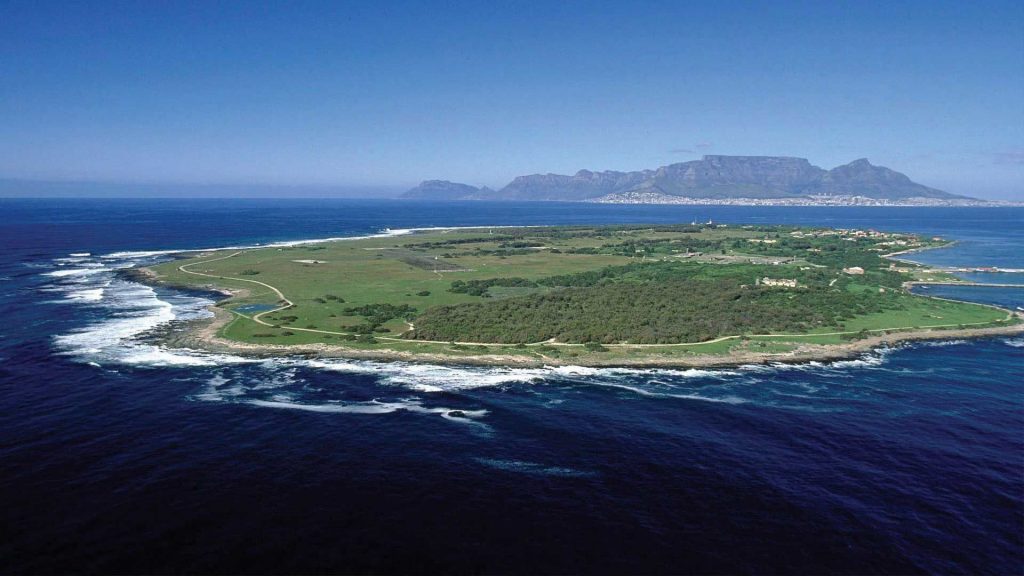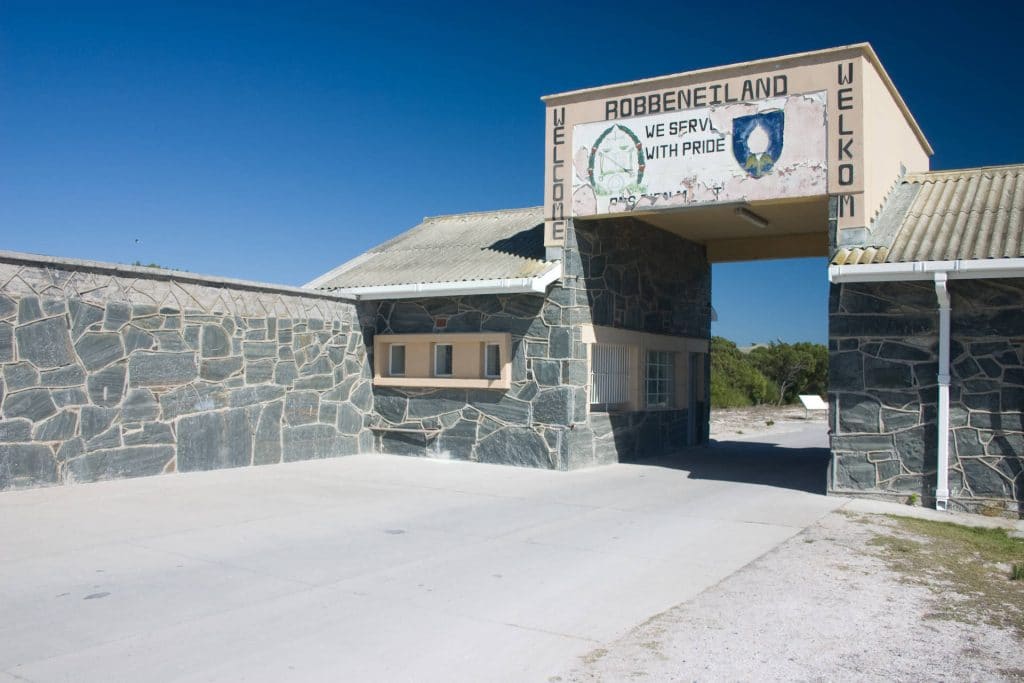Robben Island is one of South Africa’s most historically significant landmarks, situated in the cool waters of Table Bay, just off the coast of Cape Town. The island is known worldwide for its association with the anti-apartheid struggle, serving as a place of imprisonment for political leaders who fought for freedom. Today, it stands as a UNESCO World Heritage Site, attracting visitors from around the globe.
This blog will delve deeper into the history of Robben Island, its significance in South Africa’s past, and the ways travellers can explore this extraordinary site as part of their Cape Town adventures.

Robben Island: An Overview
Robben Island is located about 7 kilometres from Cape Town, offering a clear view of the city and Table Mountain on a sunny day. Its name comes from the Dutch word “robben,” meaning seal, due to the large population of seals inhabiting the island during the early days of Dutch settlement.
Despite its picturesque setting, Robben Island has a dark history marked by isolation and suffering. Over centuries, it has been used as a place of exile, a leper colony, a mental institution, and most infamously, a maximum-security prison for political dissidents during apartheid.
For visitors today, Robben Island offers an unparalleled opportunity to walk through history. Many choose to incorporate it into Cape Town tours packages, with options like a Robben Island and Table Mountain tour or a broader Cape Peninsula tour to round out their trip.
The Early History of Robben Island
A Place of Isolation and Exile
The history of Robben Island as a place of banishment dates back to the 17th century when Dutch settlers used it to isolate those they considered undesirable. Indigenous leaders who resisted colonial rule were some of the first to be exiled to the island. Among them were political prisoners from across Southern Africa, sent to Robben Island to suppress rebellion against Dutch colonial authority.
By the 18th century, the island had become synonymous with punishment and exile. People sent to Robben Island had no hope of returning to their communities, making it a place of deep despair.
A Leper Colony and Quarantine Station
In the 1800s, Robben Island transitioned into a quarantine station and leper colony. The South African government sent individuals with leprosy and other contagious diseases to live and die in isolation. This period added another layer of tragedy to the island’s history, as many of the lepers were forcibly removed from their homes and separated from their families.
Visitors can still see remnants of this history today during a Robben Island private tour, which provides a closer look at the structures and stories from these earlier eras.

Robben Island’s Role During Apartheid
The Maximum-Security Prison
During the apartheid era, Robben Island became notorious as a maximum-security prison for political prisoners. The South African government used it to detain leaders of the anti-apartheid struggle, including Nelson Mandela, Walter Sisulu, and Govan Mbeki.
Nelson Mandela spent 18 of his 27 years in captivity on Robben Island. His prison cell, a small 2×2-metre space, is now one of the most visited parts of the island. Prisoners endured harsh conditions, including hard labour in the limestone quarry under the blazing sun. Despite the circumstances, Robben Island became a site of intellectual resistance, where prisoners educated each other and plotted strategies for a free South Africa.
A visit to Robben Island today offers an emotional and educational experience, with many tours guided by former prisoners. Combining this with a Cape Town full day tour or a Cape Peninsula tour allows travellers to see the broader context of South Africa’s history.
Robben Island Today: A UNESCO World Heritage Site
Since the fall of apartheid, Robben Island has been preserved as a national museum and declared a UNESCO World Heritage Site. It serves as a reminder of the struggles faced by those who fought for South Africa’s democracy.
Key Attractions on Robben Island
Visitors to Robben Island can explore a variety of historic landmarks, including:
- Nelson Mandela’s Cell: The small, stark room where Mandela spent nearly two decades, which symbolises his resilience and strength.
- The Limestone Quarry: A site where prisoners endured gruelling labour, now a poignant reminder of their sacrifice.
- The Prison Museum: Offering detailed exhibitions about life on the island during its time as a prison.
Most tours to the island depart from Cape Town’s V&A Waterfront, making it a convenient addition to Cape Town tourism packages or day tours in Cape Town.

How to Experience Robben Island and Cape Town
Day Tours in Cape Town
Cape Town offers a variety of activities that cater to history enthusiasts, adventure seekers, and nature lovers alike. Many Cape Town day tours include Robben Island alongside other major attractions:
- Table Mountain Tour: A visit to the iconic flat-topped mountain, offering panoramic views of Cape Town.
- Cape Winelands Tour: Sample world-class wines in picturesque settings with options for a full day Cape Winelands tour.
- Cape Peninsula Tour: Explore the dramatic coastline of Cape Point, meeting penguins at Boulders Beach.
Small Group Tours to South Africa
For travellers seeking a more personalised experience, small group tours to South Africa are a fantastic choice. These tours often include Robben Island, giving visitors an intimate look at the island’s history while connecting with like-minded travellers.
Pairing Robben Island with Safari and Overland Tours
South Africa is a country of diverse attractions, and many travellers choose to combine cultural history with wildlife adventures:
- Safari Cape Town: Explore nearby game reserves for a chance to see the Big Five.
- Overland Tours in South Africa: Multi-day trips through the country often include stops in Cape Town, ensuring a visit to Robben Island.
- African Overland Tours: Expand your journey to neighbouring countries with options to include Namibia, Botswana, and Victoria Falls.
These tours can be tailored to your interests, whether you want to focus on history, nature, or a mix of both.

Robben Island and South Africa’s Nine Provinces
Robben Island lies within the Western Cape, one of the nine provinces in South Africa. Each province offers unique experiences, from cultural heritage to natural beauty.
- Western Cape: Known for Cape Town, the Winelands, and the Cape Peninsula.
- Eastern Cape: Offers stunning coastlines and Xhosa culture.
- Gauteng: The economic hub, home to Johannesburg, Pretoria, and historical landmarks like the Cradle of Humankind.
Cape Town Tour Packages and Beyond
Travellers exploring Cape Town can choose from a range of Cape Town tourism packages, combining historical and natural landmarks. Popular options include:
- Robben Island Private Tour: A personalised exploration of the island’s history.
- Cape Winelands Full Day Tour: Perfect for wine enthusiasts seeking a day of indulgence.
- 3-Day Safari from Cape Town: Combine a visit to Robben Island with wildlife adventures.
- 5 Day Cape Town Tour: A comprehensive package covering all major highlights.
Conclusion: Robben Island as a Symbol of Resilience
Robben Island is not just a destination; it is a powerful symbol of the triumph of the human spirit over adversity. A visit here provides insight into South Africa’s history and its ongoing journey toward unity and reconciliation.
Whether you’re interested in combining your visit with a Cape Town safari, a Table Mountain tour, or Cape Town tour packages, this experience is an unforgettable part of any South African adventure.
Explore Robben Island with Africa Moja Tours, and take a step back in time to understand the resilience, hope, and courage that shaped South Africa.



